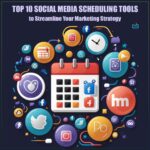In today’s digitally-driven world, data has become the cornerstone of successful marketing strategies. Businesses are increasingly relying on data-driven insights to understand their target audience, personalize their marketing efforts, and drive growth. One of the most effective ways to build valuable data assets is through digital marketing channels. Let’s explore how businesses can leverage digital marketing to collect, analyze, and utilize data to their advantage.
What is Data Building in Digital Marketing?
Data building refers to the process of systematically collecting, organizing, and analyzing data from various sources to gain valuable insights into consumer behavior, preferences, and trends. Digital marketing provides businesses with a wealth of opportunities to gather data at every touchpoint along the customer journey.
1. Website Analytics
One of the primary sources of data in digital marketing is website analytics. Tools like Google Analytics offer valuable insights into website traffic, user behavior, demographics, and more. By tracking metrics such as page views, bounce rates, and conversion rates, businesses can gain a deeper understanding of how visitors interact with their website and identify areas for improvement.
2. Social Media Insights
Social media platforms generate vast amounts of data on user interactions, engagement levels, and demographics. By analyzing social media insights, businesses can identify trends, monitor brand sentiment, and measure the effectiveness of their social media marketing efforts. This data can inform content strategy, ad targeting, and audience segmentation.
3. Email Marketing Data
Email marketing campaigns yield valuable data on open rates, click-through rates, and subscriber behavior. By analyzing email marketing data, businesses can refine their messaging, optimize send times, and segment their email list for targeted campaigns. Personalized emails based on customer preferences and behaviors can significantly improve engagement and conversion rates.
4. Search Engine Data
Search engines like Google provide valuable data on keyword trends, search volume, and user intent. By conducting keyword research and analyzing search engine data, businesses can optimize their website content, improve search engine rankings, and better understand the needs and interests of their target audience.
5. Customer Relationship Management (CRM) Data
CRM systems store valuable data on customer interactions, purchase history, and preferences. By integrating CRM data with digital marketing efforts, businesses can create more personalized and targeted marketing campaigns. Utilizing CRM data allows businesses to nurture leads, retain customers, and drive repeat purchases effectively.
Leveraging Data for Success
Once businesses have collected and analyzed data from various digital marketing channels, the next step is to leverage this data to drive business growth. Data-driven insights can inform strategic decision-making, fuel marketing campaigns, and improve overall performance across the organization.
By harnessing the power of data building through digital marketing, businesses can gain a competitive edge, enhance customer experiences, and achieve their marketing objectives more effectively. In today’s rapidly evolving digital landscape, data has become a valuable asset that can unlock new opportunities and drive sustainable growth. Embracing data-driven strategies is essential for businesses looking to thrive in the digital age.



